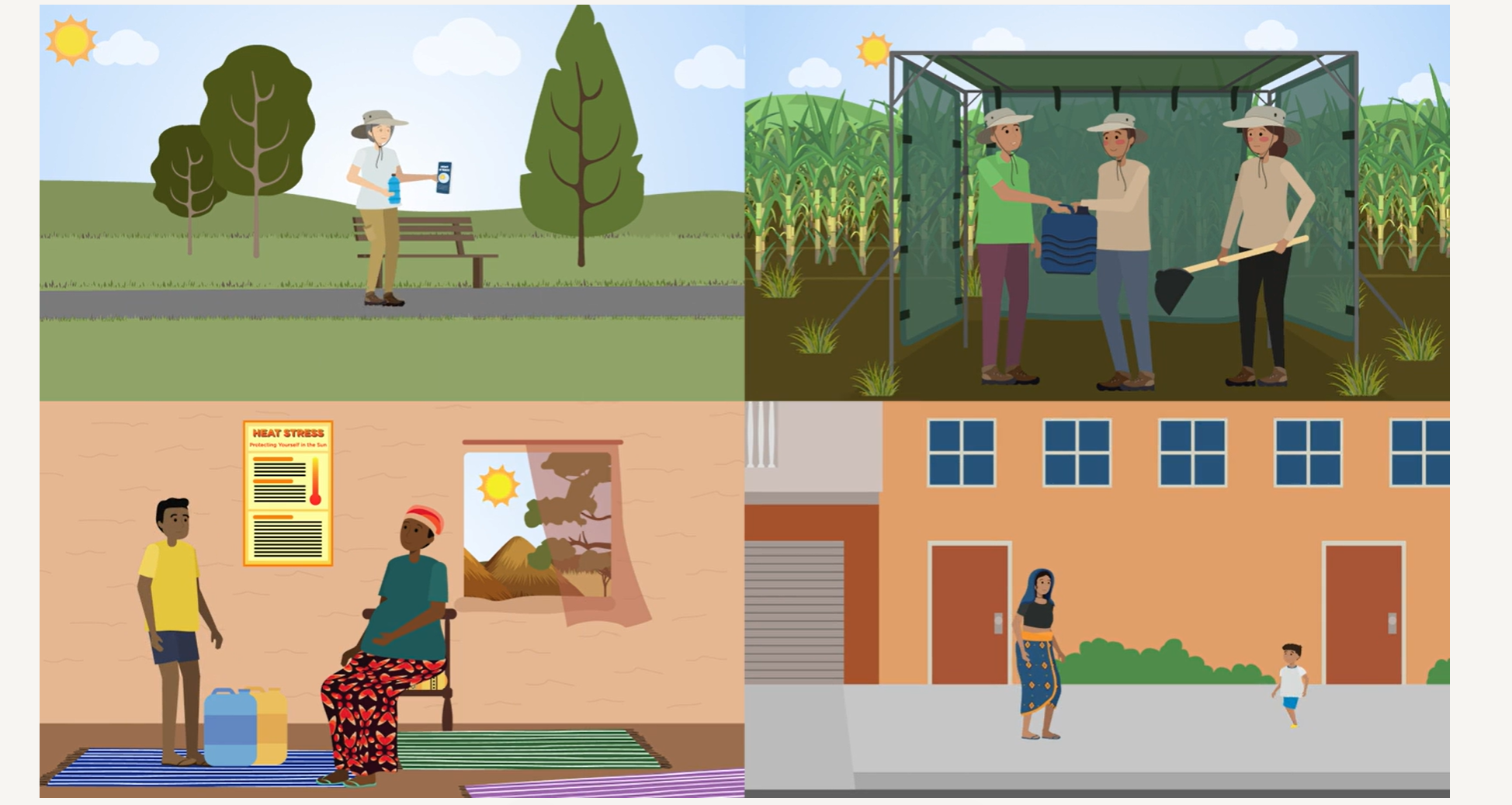
News
2024
The ENBEL2023 scientific Conference on Connecting Health & Climate Change took place in Stockholm 11-12 October 2023 and brought together in total more than 300 participants (onsite and online) from across 35 countries. Watch the recording of the sessions here.
The latest film from the ENBEL project highlights the impact that the project has had in connecting climate and health research with policymaking.
Watch the recording of our online workshop addressing health concerns of urban greenness in perspective of climate change covering the latest research findings and mitigation strategies.
The ENBEL project has developed a series of six short educational videos on climate change and health topics to give more information on how climate change effects our health and what we can do about it.
On 26 January, the University of Tartu, Karolinska Institutet, the Norwegian Institute for Nature Research and CICERO Center for International Climate Research organise an online workshop addressing health concerns of urban greenness in perspective of climate change. We will discover the latest research findings and mitigation strategies to address health challenges from those disasters.
2023
Watch the recording of our workshop addressing health concerns of forest fires in perspective of climate change covering the latest research findings and mitigation strategies to address health challenges from those disasters.
The conference Connecting Health & Climate Change #ENBEL2023 took place in Stockholm 11-12 October. Thanks to everyone who attended and made the conference such a success.
Climate change is the biggest health threat of the 21st century and its effects increasingly occur in Europe, too. Researchers, policy-makers and practitioners were gathered in Brussels 19 September to share evidence of health impacts of climate change and discuss the way forward for the European adaptation agenda.
Join us for a film screening and discussion of the film “Too Hot to Work”.
Join us at the 2nd CHANCE conference to take place in Botswana 25-26 August.
On 14 June ENBEL project partnered with the Ministry of Health in Kenya to train public health workers to measure and reduce carbon emissions in healthcare facilities.
The film “Too Hot To Work” takes viewers around the world on a tour of the current state of labor in extreme heat.
Finance for adaptation is not sufficiently targeting the countries most vulnerable to the climate crisis and falling short of needs in the health sector, indicates research from Climate Centre funded through the ENBEL project.
ENBEL releases a new film that showcases the effect of climate change on the occupational safety and health of manual laborers in Europe based on the work in the HEAT-SHIELD project.
How can co-design in climate change and health research be most successful? This policy brief provides key messages for research funders and future research projects in this field based on lessons learned from Climate, Environment and Health research projects funded by the Belmont Forum.
In order for health risks to be better integrated into adaptation policy and planning, it is critical to interconnect national and urban levels, reduce sectoral thinking and welcome external expertize and facilitate large-scale data collection and sharing of health and climate indicators, argues Annechien D. Hoeben et. al in a paper in Climate Policy.
2022
ENBEL was present and organized two side-events at the WHO health pavilion at COP27 highlighting the climate change impacts on woman’s health and how to advance climate change and health agenda, policy and financing in Africa.
In the run-up to COP27 ENBEL joined forces with the Red Cross Red Crescent Climate Centre and the International Federation of Red Cross and Red Crescent and shared and amazing set of over 30 pieces of art, accompanied by personal stories on climate change.
While air pollution from PM2.5-emissions have been reduced in Europe and North America, air pollution from wildfires is increasing. With climate change, we will see more wildfires, risking that the impacts of the efforts that have been made to mitigate air pollution and related negative health effects could be diminished.
A set of concrete recommendations to advance the climate and health agenda and to address climate-related health risks were identified by the participants in a climate and health workshop in Uganda co-organised by ENBEL-partner Red Cross Red Crescent Climate Centre and the Ugandan Ministry of Health.
More capacity is needed to monitor health effects and inequities, evaluate adaptation and mitigation interventions, address current under-representations of low- or middle-income countries, and translate research into effective policymaking, argues researchers and public health experts.
A broad range of topics related to environment, climate and health were discussed when researchers, policymakers and practitioners met for the European Public Health conference recently. Our colleagues were there and share their reflections on how the topic of climate change and health featured at the conference.
Climate change is undermining every dimension of global health monitored, states the most recent Lancet Countdown report that is tracking the connection between health and climate change.
All around the world, human health is increasingly being impacted by global warming. In a new animation we highlight what our network of researchers and projects are working on to get more knowledge of how climate change impacts health and what evidence and knowledge is needed to tackle health risks associated with climate change.
This summer has started with unprecedented heat waves and record high temperatures in many places even before the summer solstice, giving a sign of what we can expect and the challenges it may pose for our health. Heatwaves are deadly, but the health impacts can often be prevented with the right measures. We talked to our experts to learn more.
The Climate Health African Network for Collaboration and Engagement (CHANCE), successfully conducted its first on-site meeting in Tswane, South Africa, 23-24 June gathering more than 60 onsite and more than 150 virtual attendees.
Heat waves are deadly. But there are simple actions we can all take to protect ourselves, our neighbours, our family members and friends. These include drinking water, resting in the shade, and avoiding outdoor activity in the hottest part of the day.
Join us to discuss and learn more about the health effects of climate change as we kick off the climate and health day of the European Public Health Week 2022!
The recently published report on Impacts, Adaptation and Vulnerability of the IPCC’s 6th Assessment Report (AR6) paints a gloomy picture of what the future may hold regarding impacts of climate change. We have looked at some of the main findings regarding the core topics of the ENBEL project – health impacts related to environmental and occupational heat, air pollution (including from wildfires), and infectious diseases.
Health specialists at the Climate Centre are analysing flows of adaptation finance and looking at how much of this funding is used for local health programming. Preliminary results from our research on national commitments and funding streams provides an insight into the landscape of climate action.
ENBEL partner get 8 million USD in new funding from the US Government to improve workers’ health and safety in the face of climate change in Central America.
How can projects working on heat and workers health, cardiopulmonary impacts of heat and air pollution, cascading climate risks and social vulnerability and community resilience find potential synergies and joint actions?
The ENBEL project is accepted as a member of the WHO-Civil Society Working Group to advance action on Climate and Health for the next two years.
2021
The African continent is heating up more, and faster, than other regions in the world according to the recently released State of Climate in Africa Report.
ENBEL partner Norwegian Institute of Public Health interviewed Norwegian decision-makers at local and national level about how they work with adaptation to reduce the health effects of climate change. They found no clear connection between climate adaptation and health adaptation strategies in the surveyed Norwegian municipalities.
Climate action helps protect human health. World leaders and policymakers at all levels must recognize that improved health is a clear result of reducing emissions. We have four key science-based messages for COP26 leaders.
In this interview Isabel Proaño Gómez, Director of Policy and Communications, European Federation of Allergy and Airways Diseases Patients’ Associations (EFA) talks to Vlatka Matkovic from Health and Environment Alliance (HEAL) about expectations for COP26. "The climate crisis is a health crisis and patients are among the most visible victims", says Proaño Gómez. As an outcome to COP26, she would like to see more investment into research, knowledge gathering and health-oriented responses to climate change.
Climate change and health are two of the most pressing issues facing African countries. Thus, it is imperative that people engaged in climate or health issues work together. The newly established network for climate and health in Africa, CHANCE (Climate-Health Africa Network for Collaboration and Engagement), aims to facilitate interactions and create greater coherence between these often siloed communities of practice.
ENBEL is mapping stakeholders in Europe that work on adaptation focused at reducing the health impacts of climate change, understanding interlinkages and identifying areas for action. The report will be finalised by the end of 2021.
ENBEL is currently working on disaggregating and analysing findings of ENBEL partner projects focusing on vulnerabilities and health inequalities.
The Belmont AWARD-APR project performs comparative analyses of diarrheal disease risk related to extreme weather events for children under five years of age in the Asia-Pacific Region.
We had the opportunity to sit down (virtually) with Kiswendsida Guigma and ask him some pressing questions that were on my mind about heatwaves in Africa. We learned about heatwave impacts and why we often don't hear about heatwaves in Africa!
In an analysis of 15 climate change and health projects we identify areas for potential synergies between the projects. We find that the ENBEL project can add particular value in terms of synthesis of research findings, dissemination and knowledge mobilisation.
Climate change is already happening and we already see the negative health effects. One third of heat-related deaths can be attributed to climate change, according to a new study led by scientists that are EXHAUSTION partners.
What interventions may help to reduce the impact of heat stress on pregnant women, women who have given birth and their new-born babies? The CHAMNHA project engaged in co-design workshops with stakeholders in Kenya and Burkina Faso to co-create locally appropriate and feasible interventions.
The ENBEL project brings together 11 research projects focusing on heat-related health issues, opening up for range of joint activities in this critical area of research.
The webinar presented state-of-the-art knowledge on the health effects of global warming, with a particular focus on increasing temperature and heat stress in a European context, and discussed how alternative climate policy options and measures can help safeguard the health and wellbeing of citizens. The webinar was organised on 26 May 2021 under the lead of ENBEL coordinator Kristin Aunan from CICERO.
Air pollution and climate change both have an immediate adverse effect on reproductive, maternal and perinatal health outcomes, with the devastating potential to affect the health of future generations to come, writes researchers from the CHAMNHA project.
In light of summer 2021 approaching, in which we are still in a state of emergency due to the COVID-19 pandemic, the recent WHO report on evidence for heat and health prevention in Europe provides useful insights on how to adjust Heat health adaptation plans (HHAPs) to ensure an effective heat response.
Different indicators change in different ways, but climate models project a clear trend of increasing heat stress, according to a new scientific publication from the EXHAUSTION project.
2020
Climate change is according to the WHO the greatest threat to human health in the 21st century. By bringing together leaders in climate change and health research, this international project will contribute with knowledge and policy advice on climate change and health impacts.
2 December 2020 the 17 ENBEL partners and advisory board members present on four continents met for a digital kick off of the project.




















































